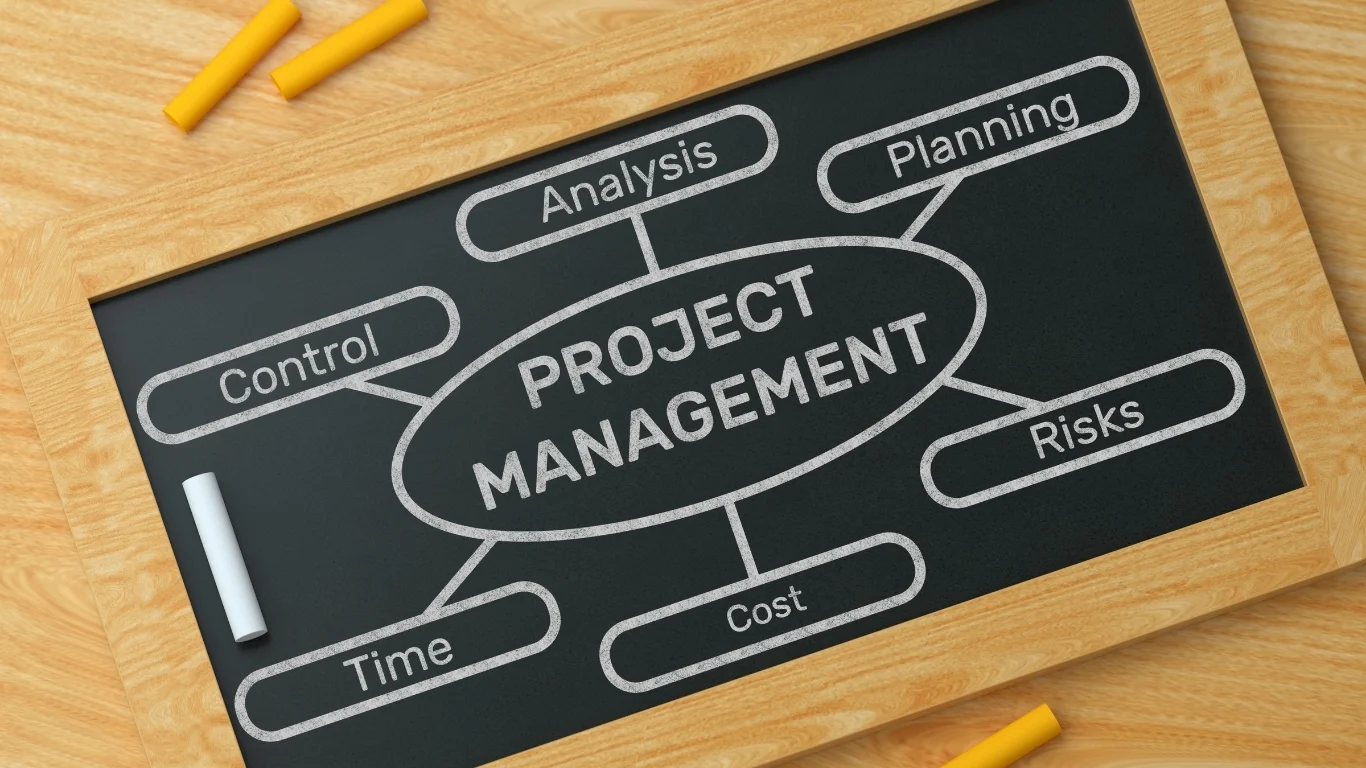Email: [email protected] Phone: +971 50 7437958
- Home
- Effective Project Management Strategies
Effective Project Management Strategies

October 26, 2024 - Software Development
In today’s fast-paced business world, effective project management is the key to success. Whether you are working on a large construction project, IT implementation, or any other complex task, managing everything efficiently is crucial. At SK Technologies, we have mastered the art of project management, especially for our clients in Dubai. In this article, I will share my personal experiences and insights into how project management can make or break a project. By the end of this guide, you will have a clear understanding of the best project management strategies and how they can be applied in your business.
Understanding Project Management
Project management is the process of planning, organizing, and controlling resources to achieve specific goals within a defined timeline. The success of a project depends on how well you can manage time, resources, and the team. In Dubai, a city known for its rapid growth and innovation, project management plays a vital role in meeting deadlines and delivering quality results.
When I first started working on project management, I learned that it is not just about overseeing tasks. It involves careful planning, strong leadership, and problem-solving skills. The key is to have a clear vision of the project’s objectives and then map out a plan that outlines each step.
Setting Clear Goals and Objectives
The first step in any successful project is to set clear goals and objectives. This may sound simple, but it is often overlooked. Without clear goals, a project can easily lose direction. From my experience, when we worked on a software development project at SK Technologies, having well-defined goals kept the entire team focused and aligned.
In Dubai’s competitive business environment, clients expect precision and timeliness. Therefore, it is important to set realistic goals that are both measurable and achievable. One method I use is the SMART framework, which stands for Specific, Measurable, Achievable, Relevant, and Time-bound goals. This ensures that the project objectives are clear and that everyone on the team understands what needs to be done.
Creating a Detailed Plan
Once the goals are set, the next step is to create a detailed project plan. A good project plan acts as a roadmap, guiding the team through each phase of the project. It includes timelines, resource allocation, and task dependencies.
I remember when we were handling a large IT project in Dubai; without a detailed plan, it would have been impossible to manage the workload effectively. A well-structured plan allowed us to stay on track and meet the client’s tight deadlines.
The plan should also include a risk management strategy. Projects rarely go exactly as planned, so being prepared for potential challenges is crucial. During one of our projects, unexpected delays occurred due to supplier issues. However, because we had anticipated this risk and included it in our plan, we were able to mitigate the impact and still deliver on time.
Communication is Key
Effective communication is one of the most important project management strategies. In my experience, clear communication with all stakeholders, including team members, clients, and suppliers, is vital to a project’s success.
At SK Technologies, we make it a priority to have regular meetings with the team and clients. This ensures that everyone is on the same page, and any issues can be addressed quickly. When we were working on a digital marketing project for a client in Dubai, regular communication helped us stay aligned with the client’s vision and adjust our strategies when needed.
Using project management tools like Slack, Trello, or Microsoft Teams can also improve communication and keep everyone informed. These tools allow team members to share updates, track progress, and collaborate effectively, even if they are working from different locations.
Team Collaboration
Team collaboration is another essential element of effective project management. In Dubai, where many projects involve multicultural teams, fostering collaboration can be challenging but rewarding. I have worked with teams from various cultural backgrounds, and I have learned that successful collaboration requires mutual respect, understanding, and a shared commitment to the project’s goals.
At SK Technologies, we believe in promoting an open and inclusive work environment where everyone’s ideas are valued. By encouraging team members to share their perspectives, we have been able to come up with creative solutions to complex problems. For example, during a recent web development project, one team member’s suggestion led to a more efficient way of coding, saving us both time and resources.
Time Management
Time management is critical to completing a project on schedule. In Dubai, where deadlines are often tight, mastering time management can make all the difference. One of the techniques I use is the Gantt chart, which visually represents the project timeline and task dependencies.
Breaking the project into smaller tasks and setting deadlines for each task ensures that the team stays focused and that progress can be measured regularly. For instance, when we were working on an e-commerce platform for a client, we divided the project into phases—design, development, testing, and launch. By managing each phase separately, we were able to keep the project on track and meet the deadline.
Managing Resources Effectively
Resource management is another crucial aspect of project management. This includes human resources, materials, and budget. Allocating the right resources to the right tasks is essential for the project’s success. I have seen projects fail due to poor resource allocation, which led to delays and increased costs.
When I managed a project for a major client in Dubai, we faced challenges in finding skilled developers. By reallocating resources and bringing in freelancers to support the team, we were able to complete the project without compromising quality. Proper resource management also includes keeping a close eye on the budget to ensure that the project remains cost-effective.
Adapting to Change
No matter how well you plan, changes are inevitable in any project. This is especially true in dynamic cities like Dubai, where market conditions can shift rapidly. The ability to adapt to changes is what separates successful project managers from the rest.
At SK Technologies, we have learned that flexibility is key. I recall one instance when a client changed the project requirements midway through the development process. Instead of panicking, we quickly reassessed the situation and adjusted our plan accordingly. By maintaining open communication with the client and being proactive in addressing the changes, we were able to deliver a successful project.
Monitoring and Evaluation
Monitoring and evaluation are essential components of project management. Regularly tracking progress allows you to identify potential issues early on and make necessary adjustments. At SK Technologies, we use Key Performance Indicators (KPIs) to measure the success of each phase of a project.
During one of our projects in Dubai, we noticed that the testing phase was taking longer than expected. By closely monitoring the KPIs, we identified the bottleneck and reallocated resources to speed up the process. This not only helped us stay on schedule but also ensured that the final product met the client’s expectations.
Once the project is completed, conducting a thorough evaluation is important. This allows you to learn from the experience and apply those lessons to future projects. At SK Technologies, we always take the time to reflect on what went well and what could be improved.
Client Satisfaction
Ultimately, the success of any project depends on client satisfaction. Delivering high-quality work that meets the client’s expectations is the goal of every project manager. In Dubai, where clients demand excellence, this is especially true.
I have found that the best way to ensure client satisfaction is to involve them in the project from the beginning. By regularly updating them on progress and seeking their feedback, we can make sure that the project aligns with their vision. During a recent project, we implemented a feedback loop where the client could review each phase and provide input. This not only improved the final product but also strengthened our relationship with the client.
Conclusion
Effective project management is essential for any business looking to succeed, especially in a fast-growing city like Dubai. From setting clear goals to managing resources and adapting to changes, each step plays a vital role in delivering a successful project. At SK Technologies, we have honed our project management strategies to ensure that our clients receive the best possible results.
By following these strategies—setting clear goals, creating a detailed plan, fostering communication and collaboration, managing time and resources effectively, adapting to change, and focusing on client satisfaction—you can ensure that your projects are completed on time and within budget. These are the key ingredients for success in Dubai’s competitive market, and they will help you build lasting relationships with your clients.
With these project management strategies, your business will be well-equipped to handle any challenges that come your way and deliver exceptional results.
